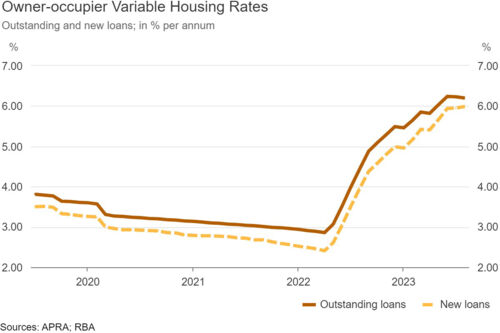The home loan loyalty tax and how to avoid it
By Tom Watson
Does loyalty pay? Not if you're a home loan customer.
In an effort to get new customers through the door lenders typically entice newcomers with their sharpest rates, leaving existing customers with little to show for their loyalty.
The Reserve Bank keeps track of this trend by publishing the average variable home loan rates being offered by lenders to owner-occupier borrowers on new and existing loans. And it's the difference between these two rates which is often referred to as the 'home loan loyalty tax'.
In December last year the gap between the rates reached 51 basis points - the highest it had been since the RBA started publishing these figures in 2019.
Since then the gap has closed though. In fact, the latest figures for the month of August show that it's now sitting at just 21 basis points, which is the narrowest it's been.

Angus Gilfillan, chief executive of digital mortgage broker Finspo, explains that this is reflective of a change in approach from lenders.
"If we cast our minds back to late last year we were in a hyper competitive home loan environment where there was a lot of aggressive pricing for new customers as well as things like attractive cashback offers.
"A lot of the lenders were really going for as much volume as they could get.
"This calendar year we've seen that flip a little bit, so there has been a shift back towards lenders trying to preserve margin and being a little bit more circumspect on pricing."
Have existing customers benefited?
Digging deeper into the figures, Gilfillan says that the reduction in the loyalty gap has come about because lenders have been more reluctant to pass on recent Reserve Bank hikes to their existing home loan customers.
"The cash rate has gone up 100 basis points from 3.1% to 4.1% since January, and new customer rates have gone up by 103 basis points. So you can see that new customer pricing being slightly higher than the RBA price increases.
"Conversely, existing customer pricing has gone up by less than the cash rate. Existing variable, owner-occupied loans have increased from 5.46% to 6.2%. So that's a 0.74 basis point increase versus the Reserve Bank going up 100 basis points."
Now that might sound like a win for existing customers, but the short of it is that while loyal customers typically haven't seen their interest rates increased in line with the cash rate in recent months, they're still paying a premium for their loyalty.
Renegotiate, refinance, save
So for mortgage holders ready to push back on the loyalty tax, how much could they potentially save by negotiating a new rate with their current lender or refinancing to an entirely different one?
The exact figure will be different for each individual borrower based on their current rate and the rate they're able to move on to. But as Gilfillan notes, the current loyalty tax of 21 basis points shows how significant it can be.
"Whilst the loyalty tax has come down, it's still material. For a customer with a $500,000 home loan, over 30 years a 0.21% difference equates to over $64,000 in savings over the life of the loan."
Rather than making it a one-off event, Gilfillan also urges homeowners with a mortgage to make the effort to renegotiate or refinance on a regular basis.
"We'd recommend having a home loan health check at least annually. Understanding whether the rate is still right for you, is that product still right for you, and are there savings to be had.
"I think any amount is better in your pocket than the lenders' pocket, and certainly if it's anything more than 10 basis points I think it would be worth either looking to reprice or to move."
Get stories like this in our newsletters.



